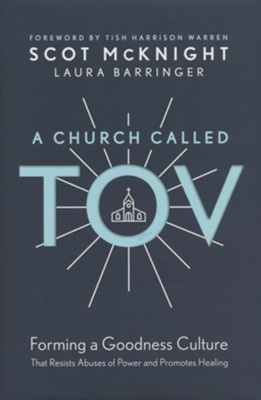“In response to recent revelations of abuses in many churches, Scot McKnight and Laura Barringer seek a path to move Christians toward where we ought to be as the body of Christ. Naming their movement after the beautiful Hebrew word "tov"—often translated as "good"—they explore ways to make the church "grace dispensers," leading to healing and transformation for all.”
Scot McKnight and his daughter Laura Barringer provide powerful insight both as to what a church community should be and what it becomes when it loses sight of its purpose. Scot McKnight is a prominent evangelical theologian who has become one of my favorite scholarly authors. He has written several well known books in which he demonstrates a great ability to balance scholarship and practicality. He is a "popular" author in the best sense of that phrase: he is not only an author but a writer. (All writers are authors but not all authors are writers, by which I mean that authoring a book is one thing while writing a readable book is a different thing.)
In this book, McKnight and Barringer explore the concept of the Hebrew word tov. They unpack its rich meaning and demonstrate how it can help Christians and churches fulfill their true calling to be molded into living models of Jesus. The sad truth is that many churches today have lost sight that the church itself, not just individual Christians, is called to be the living embodiment of Jesus. As a result we see churches of all shapes and sizes abusing their power resulting in spiritual and often sexual abuse to their members. A church with a top-down power culture is less resistant to systemic abuse than one with a bottom-up “tov” culture that promotes healing, safety, and spiritual growth.
The authors dedicated their book to “wounded resisters”. In McKnight’s blog “Jesus Creed” he explained who they meant:
“Who are the wounded resisters? They are those wounded in the process of resistance….too many to name, names who are not known, names who remain silent out of fear of repercussion. ….both women and men, in the church and out of the church, …(who) have spoken up, have gone to Human Resources, have described experiences to deacons and elders and leadership teams, at times even spoken directly to the perpetrators of abuse and power mongering - and have been silenced, gaslighted, further abused, called satanic and demonic, called divisive, accused of dividing the church, spoken evil of for questioning leaders and pastors and those gifted to establish growing, flourishing, famed churches.
It took courage for the wounded resisters to speak up.
The wounded resisters expected in a church of all places to be given a hearing. They were “heard” with supposed empathy and sympathy and compassion. Nothing happened.Instead, too often, the perpetrators were storied as the victims, the victims were storied as perpetrators. They were accused and condemned…This is wrong."
The Lord knows the cries of the wounded resisters. …They are the heroes of bringing light about so many toxic leaders in churches” and Christian institutions.
They are the ones who carve pathways to cultures and pockets of tov (goodness) in churches and Christian institutions.
This is a powerful, relevant book that should be read by both church members and church leaders. One of the best things about it is that although it is framed around cultures that enable abuse it doesn’t end there. Instead we are told how to nurture a culture of goodness that is Biblical and pragmatic.
It is past time for pastors and church leaders to stop evading responsibility for enabling abusers in God’s household. I know that is a strong charge. The question is “Is it a true charge?” Recent history testifies that it is.
An enabler is someone whose behavior allows a loved one to continue self-destructive patterns of behavior. Abuse enablers may not be abusive people. They often are the abuser’s friends, the abuser’s spiritual leaders, or the abuser’s organizations and alliances peers. Enablers are difficult to confront because it’s hard for them to take responsibility for being complicit in abuse when they themselves hate abuse. It’s hard to see and harder to admit that you’ve been manipulated, you’ve enabled, or that you’ve turned a blind eye and a deaf hear to stories of abuse. But McKnight and Barringer rightly point out that there has to be a community that
“cooperates with the abuser to maintain the performance needed to keep the structure intact.”
Abuse does not occur in a vacuum; it is systemic to power cultures. We need to be aware of the culture of our church. McKnight and Barringer help us see that a churches culture starts with its leaders.
“Think of it this way: Pastors and other leaders exercise a preliminary voice in forming and telling the church’s narrative, acting out the Christian life for others to see, teaching the Christian faith and how it is lived, and articulating policies. They exercise formal authority and power to create and maintain the church’s culture.”
“A rooted culture is almost irresistible. If the reinforcing culture is toxic, it becomes systemically corrupted and corrupts the people within it. Like racism, sexism, political ideologies, and success- at- all- costs businesses, a corrupted culture drags everyone down with it. On the other hand, if the reinforcing culture is redemptive and healing and good (tov), it becomes systemically good. A tov church culture will instinctively heal, redeem, and restore.”
What I appreciated most about this book is its optimism. McKnight and Barringer are committed to helping churches nurture a culture of goodness, empathy, and grace. They are equally committed to helping churches recognizing the signs of a culture of fear and power. Their challenge is simple and profound: nurture justice and put people ahead of systems.
I hope that I have convinced you to put “A Church Called Tov” on your must read list. But if you need a little more encouragement watch this “Preacher Boys” video podcast:




